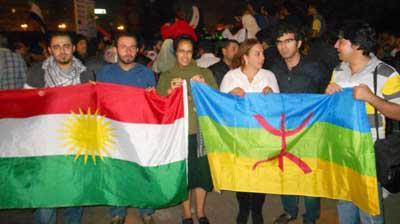The Kurds and The Amazigh: Two People, One Common Struggle
In 2011, in the Eastern city of Benghazi, whispers of dissent gave way to riotous revolution; Libyans took to the streets in unprecedented numbers, chanting anti-regime slogans, carrying signs and waving flags signaling their defiance. Two flags that were heretofore unseen in the streets of Gaddafi’s Libya came to dominate the crowds of protesters. One was Libya’s national symbol of rebellion, a red, black and green striped flag with a white crescent moon at its center, last seen before Gaddafi’s 1969 coup.
The second flag was less recognizable. It depicted a red symbol resembling a stick figure man, set against a stripped tricolor background: light blue, lime green and yellow. This flag is the international emblem of the Amazigh people and for the first time in over 40 years, Amazigh Libyans were proudly waving it above their heads without fear of persecution.
The Amazigh, often referred to as Berbers, are an ethnic group indigenous to North Africa predating the arrival of Arabs in North Africa. They once constituted a majority in the region, but over the years, as Arab conquerors overtook the land, the Amazigh not only dwindled in numbers but also underwent an “Arabization” of their identity. Some of this occurred naturally, as more Arab-speakers settled in Libya, but often times it was a forced “conversion” – as it was under the Gaddafi regime.
With the publication of his Green Book in 1973, Libya’s new revolutionary leader set about an active erasure of Amazigh cultural, social and ethnic identity. He began by banning any books that acknowledged existence of the Amazigh. He outlawed practice of Tamzight, the Amazigh language, dismissing it as a “dialect” of Arabic. He prohibited use of Amazigh names. Amazighi celebrations and cultural traditions were forbidden. Gaddafi propagated a Libya that was wholly and purely Arab, and accused the Amazigh people of being colonial projects intended to divide Libyans.
“You can call yourselves whatever you want inside your homes – Berbers, Children of Satan, whatever – but you are only Libyans when you leave your homes,” Gaddafi was quoted as saying in a U.S. Embassy cable to Amazigh leaders.
Gaddafi’s revolutionary committees targeted Amazigh communities for raids, arrests and harassment. They attacked the homes of known Amazigh activists and artists. Leaked U.S. diplomatic cables reveal the details of the brutal assault on an Amazigh town in 2009.
Revolutionary Committee and al-Ghad members threw stones at and beat [Yifren] residents who gathered to protest the attacks. A number of businesses and other residences were damaged, including several that were burned. Police threatened to imprison anyone who attempted to interfere with the Revolutionary Committee and al-Ghad members. Revolutionary Committee and al-Ghad members chanted anti-Berber slogans (“death to the Berber dogs”) throughout the incident.
It was no surprise then that, when the call for insurrection came, the Amazigh towns were among the first to rise against the regime and join the battle for freedom. Amazigh fighters were crucial to the victory of the opposition, maintaining anti-Gaddafi strongholds in the Nafusa Mountains and facilitating supply routes in the region.
In many ways, the Amazigh struggle parallels the narrative of Kurds in Syria, Iraq, Turkey in Iran. Kurds residing between the borders of those countries are systematically persecuted in the same manner as their Amazigh counterparts in Libya, Algeria, Morocco and Tunisia. Kurdish oppression is often state-sanctioned — erased from the history books, prohibited from speaking in their mother tongue, denied — in some places — to call themselves by their Kurdish names, and limited from participating in the political process. Today, Kurds across the region fear unprovoked attacks and unjustified arrests. Their marginalization from political, economic, and social spheres are symptomatic of institutionalized racism.
It’s significant, however, that the first signs of resistance to oppressive regimes comes from groups like these: not the majority but the anguished minority. Like the Kurds, the Amazigh had been battling the Gaddafi administration for recognition of their identity and culture for decades before the revolution. And when the revolution finally came, they were the first willing to risk their lives for better opportunities — not just for themselves, but for the country as a whole. Similarly, the future will look back on this time in Kurdish history more favorably and admirably than the present; it will remember Kurdish struggles as the first manifestations of revolution and change.
It’s often said that civilization’s moral character is best measured by how it treats its weakest members. But this passive statement dismisses the agency of its subject. A far more accurate contention would hold that civilization’s capacity for profound societal change is best gauged by the strength of its weakest members. By that measure, civilization will soon find itself grateful for the Kurdish — and Amazigh — members it disregards now.

Comments
all amazighs and kurds goo ahead to your aims. trendy jewelry
Pingback: The Kurds and The Amazigh: Two People, One Common Struggle | REAL news ALL LIBYA